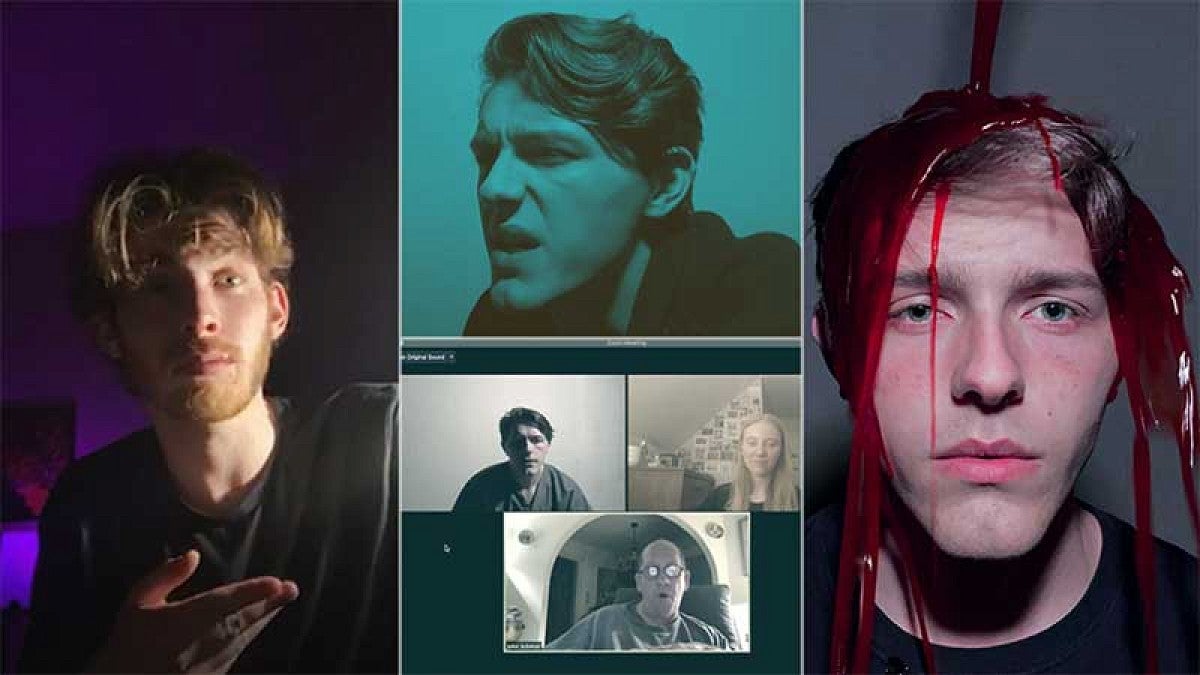Filtered through the lens of early zombie movies and set in a subterranean morgue, “Or Not to Be,” an adaptation of Shakespeare’s “Hamlet,” was cast, designed and set to be performed on the Robinson Theatre stage at the end of spring term.
That is, until COVID-19 changed everything.
After months of preparation for his role as Claudius, graduating senior Nathan Shapiro called his father, an online entertainment representative in Los Angeles, to break the disappointing news.
“The (postponement of) commencement was not as painful as the show was for me,” he said. “I had trained for several months for the audition, so I called my father and told him to cancel the plane tickets.”
But then, a ray of hope: Shapiro’s dad contacted associate professor of theater arts John Schmor and said, “Don’t give up on the show, there’s got to be a way that the students can do this in isolation.” Perhaps the show could go on, but in an alternative format.
The nudge made all the difference, and the idea that students could perform their scenes at home separately, record them and then have the footage edited into a movie, was born.
“At first I thought, ‘Oh that’s crazy, there’s no way,’” Schmor said. “But then the more I thought about it, the more I thought, well, that would give students a project rather than thinking about play direction in the abstract.”
For several graduating students in Schmor’s play direction class who had hoped their final term at the UO would end differently, the make-lemons-into-lemonade approach met with some skepticism.
“I was a little dubious about it at first,” Shapiro said. “A lot of us sort of feel cheated; we were upset that we couldn’t do it, but now that we have an outlet for it, it’s great.”
Cade Holbrook, who plays Hamlet, also had some reservations but decided it was a viable option.
“I thought it was better to do something with it than to just throw it all away and forget about it,” he said. “Especially because it’s my last year and I wanted to have something that I’d done in some regard.”
“I’m really impressed by the cast for voluntarily going through this,” Schmor said. “Even though we don’t get to do this show on stage this is at least one way we can have the experience together.”
The class jumped into Zoom rehearsals with student directors walking the actors through their ideas about how to frame scenes, what kinds of action might happen and discussion about character and relationship, all the things that happen in a normal classroom setting, except this time they were not in the same room with each other. Using Zoom allowed them to watch each other’s responses.
“You can at least get a sort of connection that you can play off the other person,” Holbrook said. “It’s not going to be the same as it would be on stage, but we’re doing the best with what we’ve got.”
Using available resources also applies to each individual’s home setup. Fortunately, the entire play is set in a drab morgue, so having students create a consistent neutral white space to perform in front of shouldn’t be an obstacle.
“We want it to look like it is all one fever dream or hallucination, or maybe taking place outside of time, and that’s why no one is in the same shot and everything is so dark and dreary looking,” Shapiro said. “We’re hoping tight shots and dark backgrounds will make it all seem the same.”
“Or Not to Be,” which is based on “Hamlet,” one of Shakespeare’s famously tragic plays, has been transformed into a dark comedy of sorts.
“The king in the beginning talks about feasting on flesh so there’s actually a lot there in the original text that lent itself to a zombie adaptation,” Holbrook said. “All those moments lean into this sort of crappy teen horror movie with a bit of comedy and a bit of an over-the-top nature but that also retains quite a bit of the original drama of ‘Hamlet.’”
Costuming and props are the bare minimum too, although Schmor provided students with zombie contact lenses and a recipe for making fake stage blood.
“The costuming is whatever they have and I gave them guidance on that, but we’re not trying to make a masterpiece here,” he said.
When rehearsal is complete, the next step will be to film each scene separately on a Zoom call. Students can listen and play off one other while recording themselves individually on their phones.
A cinema studies student has volunteered to turn the footage into a film, which may or may not land on YouTube or any number of other platforms for viewing, depending on quality and class consensus. And if anything, it will provide a unique snapshot of this extraordinary moment in history.
Although it wasn’t the same as an onstage theater experience, filming it remotely gave the students a chance to engage with the play and each other even if it wasn’t the way they had planned it.
“Maybe a zombie-Hamlet filmed on student phones is not a great answer, but for me, anyway, it has raised a lot of good teaching questions,” Schmor said.
—By Sharleen Nelson, University Communications


